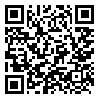Volume 9, Issue 17 (2022)
QHTS 2022, 9(17): 170-195 |
Back to browse issues page
Download citation:
BibTeX | RIS | EndNote | Medlars | ProCite | Reference Manager | RefWorks
Send citation to:



BibTeX | RIS | EndNote | Medlars | ProCite | Reference Manager | RefWorks
Send citation to:
OMIDVAR A, chehri M, eghbali M, kariminia P. Analyzing the Meaning and Translation of Alqa al-Alwah (Tossed the Tablets) from the Holy Quran. QHTS 2022; 9 (17) :170-195
URL: http://qhts.modares.ac.ir/article-10-63039-en.html
URL: http://qhts.modares.ac.ir/article-10-63039-en.html
1- Member of the academic staff of the Holy Quran University of Sciences and Education , omidvar@quran.ac.ir
2- Member of the academic staff of the Holy Quran University of Sciences and Education
3- Master of science
2- Member of the academic staff of the Holy Quran University of Sciences and Education
3- Master of science
Abstract: (2647 Views)
Ignoring the precise meaning and implications of Quranic lexicons appended to its text in various styles or registers may cause misunderstanding and inaccuracy in determining the connotation of the holy Quranic verses. The same problem has driven many Quranic commentators and translators to disregard the original meaning of the Quranic phrase Alqa al-Alwah [Tossed the Tablets] (Al-A'raf/105) and instead conceive it as a phrase that relates to Moses' (PBUH) violence and rebellion. However, this misinterpretation vividly contradicts the chastity of the holy prophets, and as a result, some scholars, following the Israiliyyat hadiths, have portrayed Moses as an impatient and furious prophet. Using a descriptive-analytical approach and dictionary and commentary resources, this research seeks to reveal the true meaning of this Quranic phrase and correct misconceptions about the holy prophet as someone who disregards God's commandments. The findings demonstrate that the root "La-qa-ya" does not have the connotation of "throwing," and the meaning retrieved from employing it in the pattern of If'al (Alqa) does not necessarily give it the sense of "throwing." The underlying practical meaning of Alqa al-Alwah is "to put down or toss," which refers to putting something from up to down in a non-insulting manner. This Quran phrase has a metaphoric connotation of "refusing to explain The Ten Commandments." An accurate translation may include both of the above-mentioned meanings. However, many Quran translators have failed to reflect both meanings simultaneously.
Article Type: مقالات علمی پژوهشی |
Subject:
Arts and Humanities (General)
Received: 2022/07/20 | Accepted: 2022/08/30 | Published: 2022/09/1
Received: 2022/07/20 | Accepted: 2022/08/30 | Published: 2022/09/1
Send email to the article author
| Rights and permissions | |
 |
This work is licensed under a Creative Commons Attribution-NonCommercial 4.0 International License. |







